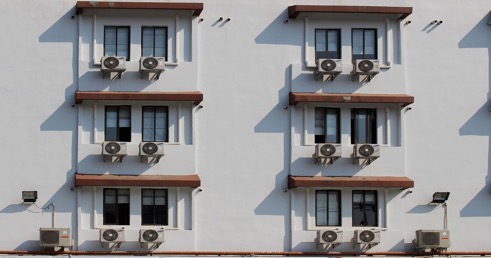Building or renovating a house can be a lot of fun, but there are a few difficult decisions that you’ll run into. Some decisions are easily answered, but others require some time, thought, and even research to come up with the best answer that will suit your house best. It can be very tempting to go with the cheapest option, but when the long summer months hit, you might find yourself regretting that purchase in favor of another.

Photo courtesy of i.imgur.com.
Ducted Air Conditioners
This type of air condition is generally the costlier of the two, but very efficient. The duct system allows a homeowner to cool or heat each of the rooms in their house individually and makes each room of the house comfortable for whomever is in that given room. The zoning ability of cooling specific rooms is a great perk, but if the zoning function is not usable, ducted air conditioning can end up costing you a lot more than you might like. They are also much more discreet than a split system unit, so that design of rooms is not spoiled by a large unit in the room, and is also the quieter of the two options. If you find yourself making choices heavily on aesthetic, this air conditioner is probably more appealing.
Another thing that ducted conditioners brings with it is professional installation. This isn’t really a project you can take up yourself and can generally be a pretty extensive set up. For builders, it’s less of a problem, but if you want to do a quick and clean renovation, this may be a little more time consuming and messy than what you may want. If you are doing larger renovations, or simply in the process of building a house, then ducted air conditioning might be the right option for you.
Split System Air Conditioning
Split system is first and foremost more suited to cooling smaller spaces, like a single room or small apartment space. They are a lot cheaper than ducted air conditioning systems and are also much more easily installed. Whereas ducted conditioners take quite a while to set up, split systems can be installed within a day or so with the help of a licensed technician.
Systems like this are certainly viable for smaller spaces, or multiple units throughout a few rooms, but if you are looking for a larger home unit, this option may be a bit small for you. If you are simply renovating a small space though, then this is certainly the way to go, the price for the unit and installation are usually not too expensive, and the unit requires minimal maintenance after setup.
Of the two options, split systems are certainly the more flexible with how and where it is installed. Though the unit itself might be a bit unsightly, the cost of cooling or heating one single room is much more preferable to wasting money cooling an entire house. This type of unit also won’t ruin your budget or require substantial construction for installation or maintenance. If a quick installation and easy maintained unit is appealing to you, then split system might be the system for you.
Which One?
Overall, both options have their perks, so finding a skilled electrician in his company that you trust is important. Getting a few quotes and opinions might help. It can be difficult to find a quality electrician that you trust, but if you look for reviews and contractor forums online, you’ll likely find a great company to help with your project in no time.
Both types of units certainly have pros and cons, but in the end, neither can be considered really better than the other: it depends on how you want to cool your home and what you’re looking for in an air conditioner. Each one has an extensive list of upsides and downfalls, so you really should look at what kind of unit you think will suit your home, what kind of budget you have, and what kind of look you’re going for after you’re done with installation.